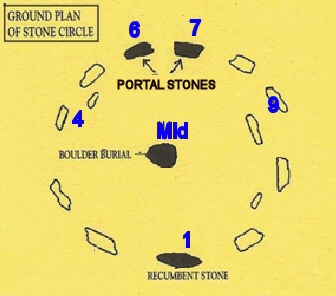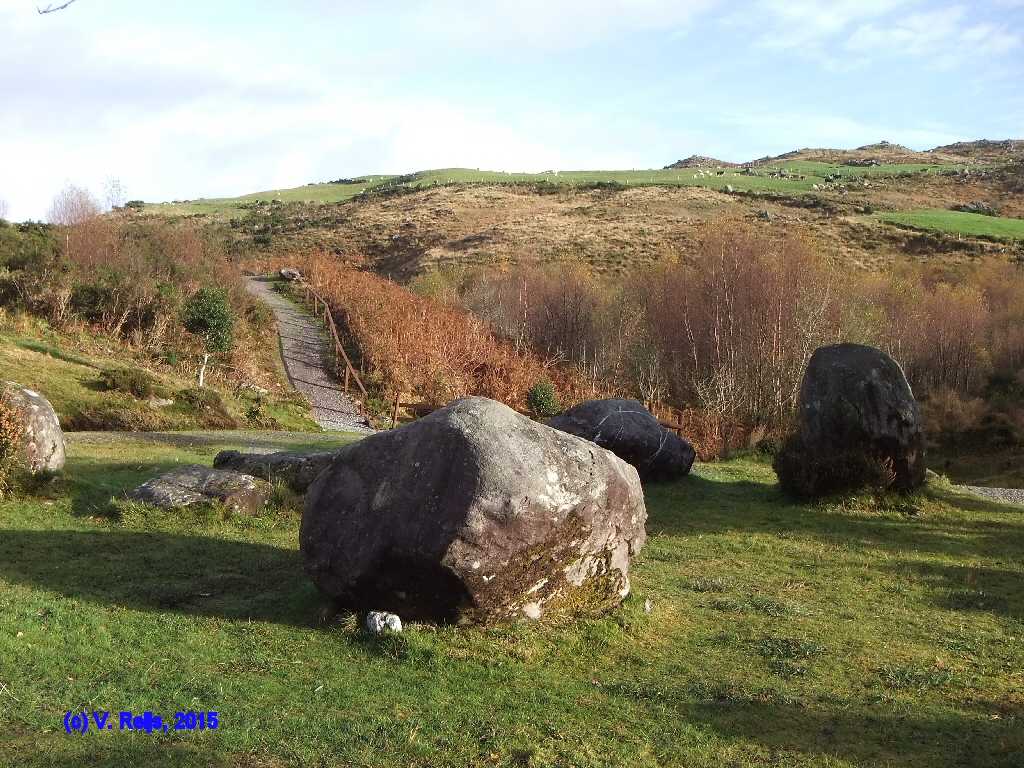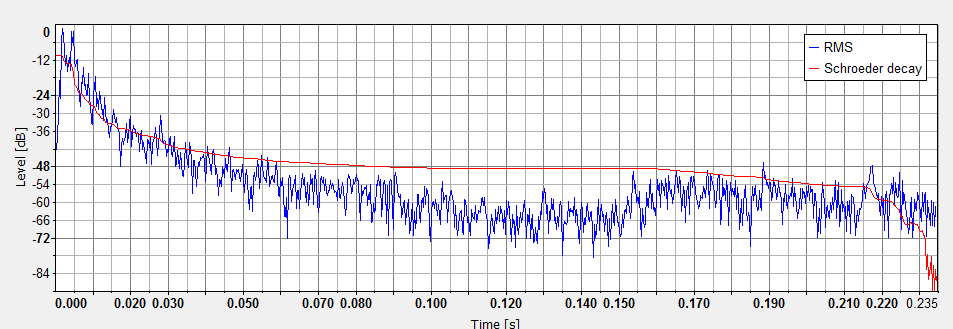Sound recordings at Dromagorteen stone circle
The circle
Some sound recordings have been done on November 14th
and 15th 2015 at Dromagorteen stone circle, situated in
the Bonane Heritage park. The stone circle is of the type of Axial
Stone Circle (ASC) with 13 stones. The present day layout of the
stone circles can be seen in Fig1.
The dimensions

Fig. 1 Dromagorteen stone circle [after Bonane Heritage park,
2010]
The circle has a diameter of around 10 m.
Distances between stones (the time is determine by using sound speed at ~16 C of 341 m/sec):
StoneX-Stone1
|
Distance
to Stone 1
|
Time
[msec]
|
| Mid(dle)-1 |
4.3
|
13
|
4-1
|
8.6
|
25
|
4-Mid-1
|
9.7
|
28
|
| Between 6 and 7-1 |
10.3
|
30
|
9-1
|
9
|
26
|
9-Mid-1
|
10.2
|
30
|
Observations at stone circle
The microphone (Zoom
H1 recorder) was on top of the recumbent stone (Stone1) some
0.8 m high and the sources (balloon, paper
banger) were at around 1.2 m high.
StoneX-Stone1
|
Peaks at
times [msec]
|
Mid-1
|
0,34/0,29
|
4-1
|
0,17
|
| Between 6 and 7-1 |
0.32/0,3,12,33
|
9-1
|
0.36
|
In below figure is an example of the bursting of a small balloon
between the two portal stones (Stone 6 and Stone7). You can see
power peaks around:
- 3 msec
traveled an extra 1 m, which could reflection against some stone
near the portal stones or Stone1
- 12 msec
traveled an extra 4 m, which could be a reflection from Stone4
or Stone9 to Stone1
- 33 msec
traveled an extra 11 m, which could be a reflection from Stone1,
MidStone and back to Stone1.

Fig. 2 Impulse response from small balloon
The above and below RMS level graphs are made by the Aurora
module for Audacity
2.0.0.
A binaural recording
One binaural recording (with paper banger impulse from near Stone 1)
was made, showing a reflection from a sloping hill some 370 m
north-west (Sun rise on summer solstice) of the stone circle (see
Fig. 3).
 Fig. 3 Sloping hill on the north-west side of the stone circle
Fig. 3 Sloping hill on the north-west side of the stone circle
Fig. 4 gives the power levels at Stone1 (370 m is around 2.1 sec in
round trip time).
 Fig. 4 Impulse response at Stone 1, by paper banger
Fig. 4 Impulse response at Stone 1, by paper banger
On that same recording a kind of flutter
echo can also be perceived (twice [before and after ~2.1 sec], with
a duration of around 1 second).
Unfortunately a repeat impulse did not show this, but the
angle/direction of the impulse sound could have been different.
Impulse response on a beach
Several sound sources have been used at the beach (at Gormanston,
Ireland). The wind was quite loud (even at Beaufort 4), even with
using a wind muffler. So the microphone was positioned in the
protection of a high dune (some 10m height). The microphone
(directed to the sea) was standing some 24 m from the steep sand
dune, and the sound source (small paper banger, A4) some 4 to 5 m
from the microphone.
Two peaks are seen in the impulse response (IR): one direct and
the other was a reflection from the ground (some 2 msec later).
There was also a reflection visible from the sand dune (some 155
msec). See Fig. 5.

Fig. 5 Impulse response at beach
The duration of the IR is somewhat longer than the one seen with
the balloon burst [Pätynen, 2011], but those balloons were in
an anechoic room without any reflection (so also no reflections
from the ground).
Summary
Some aspects to be reconsidered in the future for preparation of
acoustic measurements at wooden circles:
- Beside the possible flutter echo,
no other unexpected acoustical effects were perceived and/or
recorded.
- The wind speed needs to be as low as possible (perhaps low 3
Beaufort max?).
- It is important to make sure that producing an impulse is done
in a repeatable way. So know where to the banger was pointed,
where was the balloon punctured and at what height.
- It is not clear if MLS or SineSweep could be useful for these
open space monuments [Stan, 2002, 258-59]. SineSweep is not
advised to be used in a open spaces (due to influence of noise;
say by wind or people).
- According to Cross&Watson [2006, p110-113]; echoes,
flutter echoes, acoustic (objective) envelopment and sound
shadow effect need to be studies for open air monuments.
References
Bonane Heritage Park. 2010.'Tours', in
http://www.bonaneheritagepark.com/tours.htm [accessed 24 November
2015].
Cross, Ian, and Aaron Watson. 2006. 'Acoustics and the human
experience of socially-organized sound.' in Chris Scarre and Graeme
Lawson (eds.), Archaeoacoustics. (Cambridge: McDonald institute for
archaeological research).
Pätynen, Jukka, Brian F.G. Katz, and Tapio Lokki. 2011.
'Investigations on the balloon as an impulse source', The Journal of
the Acoustical Society of America, Vol 129: EL27.
Stan, Guy-Bart, Jean-Jacques Embrechts, and Dominique Archambeau.
2002. 'Comparison of different impulse response measurement
techniques', Journal of the Audio Engineering Society, Vol 50: pp.
249-62.
Acknowledgments
I would like to thank the following people for their help
and constructive feedback: Steve Marshall and all
other unmentioned people. Any remaining errors in methodology
or results are my responsibility of course!!! If you want to
provide constructive feedback, let me know.
Major content related
changes: November 24, 2015




